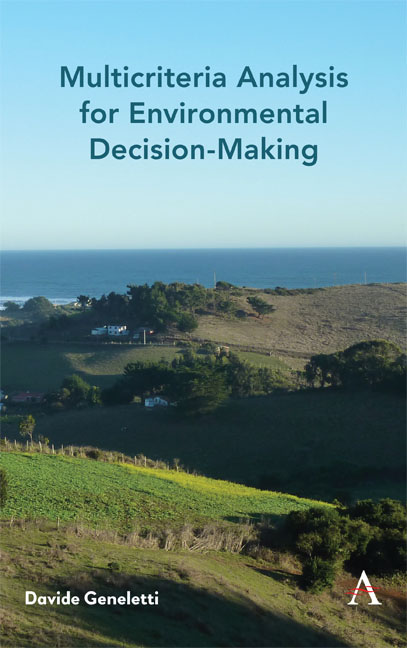Book contents
- Frontmatter
- Contents
- List of Figures
- List of Tables
- Acknowledgements
- List of Author and Contributors
- Introduction
- 1 Principles of Multicriteria Analysis
- 2 A Review of MCA Applications for Nature Conservation
- 3 Landfill Site Selection: Combining Spatial MCA with Stakeholder Analysis
- 4 Protected Area Zoning: Integrating Spatial MCA and Multi-objective Evaluation
- 5 Forest Landscape Restoration: Applying MCA to Design and Compare Options
- 6 Impact Assessment of Ski Areas: Combining GIS Indicators with MCA
- Conclusions
- Annex
- References
- Index
1 - Principles of Multicriteria Analysis
Published online by Cambridge University Press: 16 July 2019
- Frontmatter
- Contents
- List of Figures
- List of Tables
- Acknowledgements
- List of Author and Contributors
- Introduction
- 1 Principles of Multicriteria Analysis
- 2 A Review of MCA Applications for Nature Conservation
- 3 Landfill Site Selection: Combining Spatial MCA with Stakeholder Analysis
- 4 Protected Area Zoning: Integrating Spatial MCA and Multi-objective Evaluation
- 5 Forest Landscape Restoration: Applying MCA to Design and Compare Options
- 6 Impact Assessment of Ski Areas: Combining GIS Indicators with MCA
- Conclusions
- Annex
- References
- Index
Summary
Introduction
Essentially, multicriteria analysis (MCA) is a method to support decision-making, by exploring the balance between the pros and cons of different alternatives. The comparison of alternatives is based upon a set of explicitly formulated criteria, which represent aspects of the alternatives that need to be taken into account during decision-making. More specifically, MCA assists the decisionmaking process by framing decision problems, illustrating the performance of the alternatives across all criteria, exploring trade-offs, formulating a decision and testing its robustness. All this while considering, on the one hand, the ‘analytical’ performance of the alternatives across all criteria, and, on the other hand, the preferences and opinions of the stakeholders involved in the process.
Many MCA approaches exist, which differ, inter alia, in terms of computational complexity, level of stakeholder engagement, and time and data requirement. Belton and Stewart (2002) present a detailed analysis of the theoretical foundations of different MCA approaches, as well as their comparative strengths and weaknesses. It could be argued that most approaches share the same main stages of the generalized MCA process shown in Figure 1.1 (based on Kiker et al. 2005; Geneletti and Ferretti 2015), in which a key aspect is the involvement of different actors providing different types of input to the process. The first stage of the MCA process aims at establishing a shared understanding of the decision context, and structuring the problem. Operationally, it includes defining the objectives of the decision process, identifying possible alternatives to achieve them and formulating explicit criteria to assess how each alternative contributes to achieving the objectives. This stage is explained in detail in Section 1.2.
The second stage is the actual analysis, broadly consisting of: criteria assessment, weighting, criteria aggregation and sensitivity analysis (see Mundaa et al. 1995; Roy 1996; Belton and Stewart 2002). In short, criteria assessment is the quantification of the performance of each alternative against each criterion defined in the first stage. Weighting accounts for the different levels of importance of the criteria to the decision, and it refers to quantified preferences among possible outcomes for criteria from the perspective of decision-makers and/or stakeholders.
- Type
- Chapter
- Information
- Publisher: Anthem PressPrint publication year: 2019



